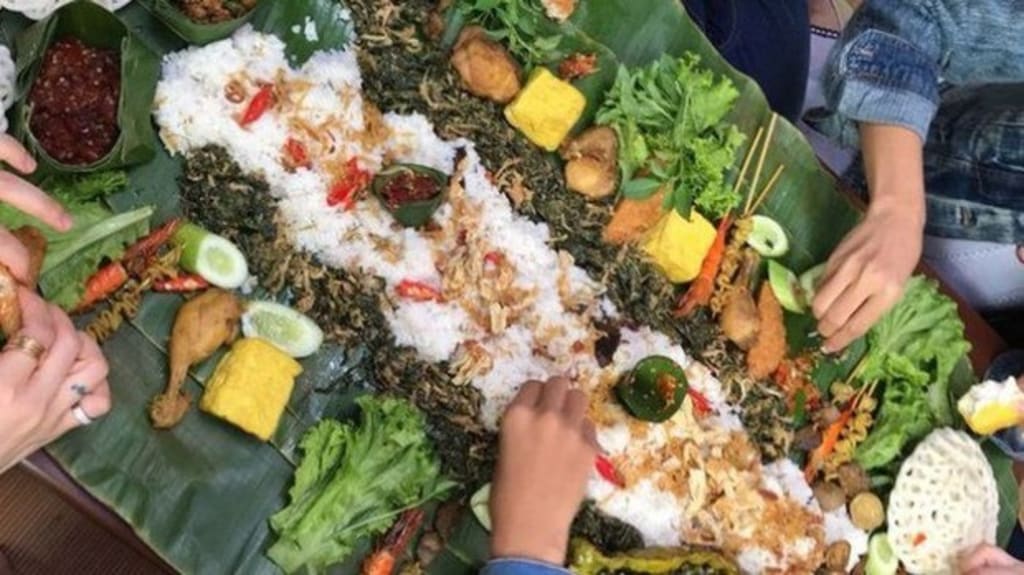Liwetan:
An Indonesian Communal Dining Tradition That Strengthens Bonds

Liwetan is a communal dining tradition in Indonesia where dishes are served in large portions and placed on banana leaves or food wrapping paper. This way, everyone can enjoy the various types of food together. The food is typically eaten with hands, a practice known as "muluk" in Javanese.
Origins and Significance of Liwetan
Liwetan originates from Javanese tradition and has been around for generations. The word "liwetan" comes from "liwet," which refers to cooking rice in a traditional manner using coconut milk and various spices, giving it a distinctive savory flavor. Initially, this tradition was practiced by agrarian communities as a form of gratitude for bountiful harvests and as a means to foster communal harmony.
Beyond its culinary aspect, liwetan holds deep social significance. In Javanese culture, communal dining symbolizes unity and fraternity. Sitting together on the floor without any barriers like tables or chairs, everyone is considered equal, fostering a sense of togetherness and breaking down social barriers.
Preparing for Liwetan
The preparation of liwetan typically involves many people, from cooking to arranging the food. The rice is cooked with spices such as lemongrass, bay leaves, shallots, garlic, and coconut milk. This process requires patience and precision to ensure the rice is perfectly cooked and imbued with a rich, savory taste.
The dishes accompanying the rice vary widely. Common choices include fried chicken and grilled fish, but tempeh, tofu, and spicy eggs are also popular. Vegetables like sayur asem (sour vegetable soup), sayur lodeh (vegetable stew), or urap (vegetable salad with grated coconut) often complement the meal. No liwetan is complete without sambal, a spicy condiment that enhances the flavor of the dishes.
Once everything is prepared, the food is arranged on cleaned banana leaves. The banana leaves not only serve as a dining mat but also impart a unique aroma that enhances the flavor of the food. The dishes are neatly arranged, with the rice at the center, surrounded by the various side dishes and vegetables.
The Liwetan Dining Experience
The experience of enjoying liwetan is unique and simple. Without using utensils, everyone eats with their hands, known as "muluk" in Javanese. Eating with hands is believed to provide a more enjoyable sensory experience as one can feel the texture of the food directly.
Everyone sits in a circle around the spread of food. There are no individual plates; instead, all the food is shared from a common spread. This creates a warm and intimate atmosphere. The moment is usually filled with light conversation, laughter, and naturally flowing stories.
Liwetan in the Modern Era
Despite being a long-standing tradition, liwetan has found relevance in modern times and is gaining popularity. Many people long for the communal and simple ambiance that liwetan offers. As a result, more and more restaurants in urban areas are adopting the liwetan concept as a unique selling point.
These restaurants not only serve delicious food but also provide an authentic dining experience. Diners can enjoy the sensation of eating together on banana leaves, with a variety of traditional dishes that tantalize the taste buds. Additionally, this concept is often used for special occasions such as birthdays, social gatherings, or family get-togethers.
Liwetan on the International Stage
The liwetan concept is not only popular in Indonesia but is also attracting attention internationally. Indonesian restaurants around the world are introducing liwetan and garnering interest from many people. They are intrigued by the unique presentation of the food, the authentic taste, and the communal values embedded in the tradition.
Several restaurants abroad even host special liwetan events to introduce Indonesian culture to the local community. These events are typically attended by a diverse crowd, including locals, the Indonesian diaspora, and tourists looking to experience something different.
The Communal Value of Liwetan
One of the core values of liwetan is togetherness. Eating from a common spread without any physical barriers fosters a strong sense of unity among the group members. Everyone shares the same food, sits close together, and interacts without any hierarchical distinctions.
Liwetan is also a significant moment for sharing stories, experiences, and joy. In a relaxed and friendly setting, people feel more open to talk and listen. This strengthens social bonds and builds trust among participants.
Liwetan as a Cultural Introduction
Liwetan is more than just a dining method; it is a medium for introducing Indonesian culture to the world. Through liwetan, people can learn about Indonesia's diverse culinary heritage, the social values upheld, and the local wisdom embedded in the tradition.
In this era of globalization, liwetan serves as a way to preserve and introduce cultural heritage to younger generations and the international community. By continuing this tradition, we can maintain our cultural identity and share it widely.
Conclusion
Liwetan is more than just a communal dining method. It is a tradition rich in social and cultural meaning. Through liwetan, we not only enjoy delicious food but also strengthen communal bonds, share stories, and celebrate joy together. In modern times, liwetan remains relevant and even more popular, both domestically and internationally. Let us preserve this tradition and take pride in our cultural heritage.
About the Creator
Enjoyed the story? Support the Creator.
Subscribe for free to receive all their stories in your feed. You could also pledge your support or give them a one-off tip, letting them know you appreciate their work.





Comments
There are no comments for this story
Be the first to respond and start the conversation.